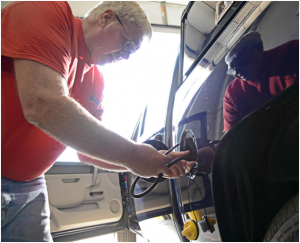In the world of logistics, fleet tracking isn’t new. The technology for basic fleet tracking has been around for years, however, more and more advanced software is improving it all the time. Whilst the benefits for the company are obvious – improved efficiency, better knowledge about the staff and vehicle whereabouts and essentially more savings on fuel – the benefits for the environment are surprising and pleasant news. Fuel saving has become a hot topic for many people and the move over to electric cars and other vehicles have meant that new electric charging stations have been installed in my locations and ultimately Tank Decommissioning will take place in petrol stations across the country.

How Better Driving Reduces Carbon Emissions
Your drivers may all be different in their approach to driving. Some may take it slow, staying at a constant speed, whilst others may rev up and slow down constantly. Everyone knows that the former makes the most sense as it reduces fuel usage, but it also massively reduces the number of emissions from the vehicle. Some cutting edge fleet tracking software will actually report about fuel consumption and even about acceleration and declaration data, allowing you to show your staff and advise them on how to improve their driving.
Less Idle?
The other way that fleet tracking can help the environment is reducing the amount of time that the engine is on but the car is idle. This obviously occurs in high traffic areas but can be avoided when fleet tracking devices are linked with traffic updates that can tell drivers when to change course and avoid traffic jams. Again, this will both reduce your costs in terms of fuel as well as get your drivers to their destinations quicker, but importantly it will mean less carbon monoxide is emitted into the environment. Not everyone realizes that more carbon monoxide is emitted when a car is idle than when it’s driving at 60mph.

Vehicle tracking systems are only going to become more popular and more advanced as the years go by. When you do choose a tracking system and have it installed, make sure you are analyzing data in terms of your company’s environmental impact as well on how to save money and improve efficiency, as you can use this in your environmental audit to demonstrate to stakeholders that you are doing your bit.
For logistics firms, the use of petrol or diesel is unavoidable until the technology is there to switch to greener fuel options, or electric vans and lorries become commonplace. Until it does, use your fleet tracking software to leave a lower carbon footprint.

